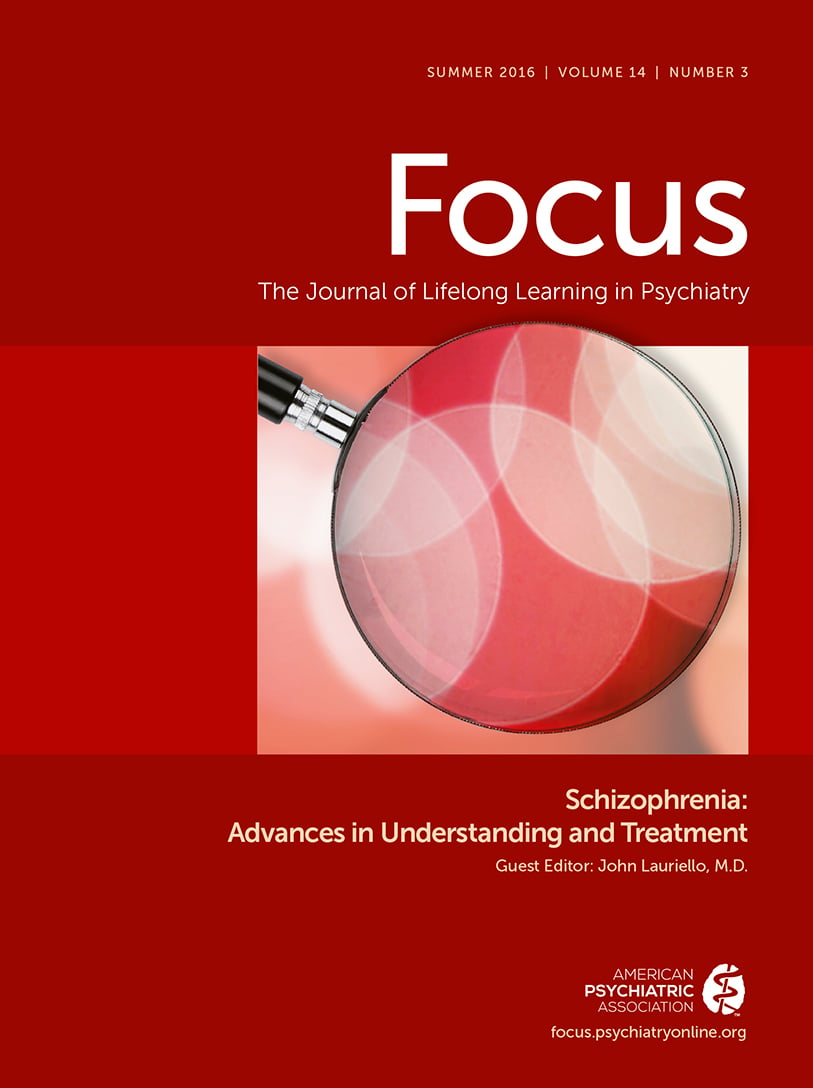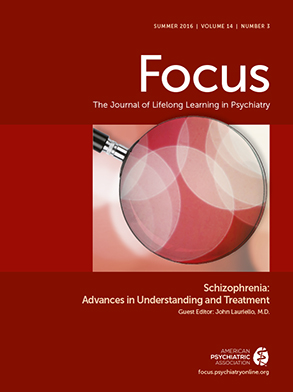A host of environmental factors are also implicated in the development of schizophrenia. These include maternal factors such as immigration, perinatal factors (infections, inflammation, obstetrical complications, maternal stress, and fetal hypoxia), and winter births (
25–
27). Evidence of vascular involvement, including enlarged retinal venule calibers, are possibly related to genes regulated by hypoxia, altered cerebral blood flow, and mitochondrial dysfunction (
26). Higher winter birth rates may be associated with gestational infections such as influenza or vitamin D deficiency. Famines leading to malnutrition during neurodevelopment are also implicated in schizophrenia (
26,
27). Folate deficiency in particular has been identified as a risk factor for schizophrenia in epidemiologic and gene-association studies. Low serum folate levels are correlated with negative symptoms of patients with schizophrenia. Elevated concentrations of homocysteine in the third trimester of maternal serum was correlated with a twofold risk of schizophrenia for the offspring. The low functioning 677C>T (222Ala>Val) variant in the methylenetetrahydrofolate reductase gene is overrepresented among patients with schizophrenia. Misvariants in three other genes that regulate 1-carbon metabolism—folate hydrolase 1 (FOLH1), methionine synthase (MTR), and COMT—are correlated with negative, but not positive, symptoms in schizophrenia. On the basis of preliminary trials, folate plus vitamin B12 supplementation may improve negative symptoms of schizophrenia for such genetically susceptible individuals (
28).
Cytokines are signaling molecules of the immune system that exert effects in the periphery and the brain. They are produced by both immune and nonimmune cells and exert their effects by binding specific cytokine receptors on a variety of target cells. There is evidence of an increased prevalence of aberrant cytokine levels among patients with schizophrenia. Infection may induce maternal immune activation, which subsequently leads to a cytokine-mediated inflammatory response in the fetus. The timing of the insult to the developing fetus may also play an important role. Associations between schizophrenia and second-trimester influenza, rubella, respiratory infection, polio, measles, and varicella-zoster have been implicated (
29).
Toxoplasma gondii (a protozoan) infection of pregnant women may cause congenital deafness, retinal damage, seizures, and mental retardation. In addition, serum antibodies to
Toxoplasma gondii were also found to be a risk factor for the development of schizophrenia (
30). The following are some cytokines and inflammatory pathways that have been studied and found to be potentially associated with schizophrenia: tumor necrosis factor (TNF) and interleukin 1 (IL-1), IL-6, and IL-8 (
31,
32). Aside from their effects on neurotransmission, particularly dopamine, antipsychotics may additionally have a balancing effect on immune responses, perhaps accounting for the delayed response seen in many cases (
33). For instance, antipsychotic treatment has been found to modulate plasma levels of soluble IL-2 receptors and to reduce the plasma levels of IL-1β and interferon-γ (IFN-γ) (
33,
34). Anti-inflammatory effects of aspirin,
N-acetylcysteine, and estrogens have also been found to be beneficial in treating schizophrenia (
35). In a recent meta-analysis, some cytokines (IL-1β, IL-6, and transforming growth factor-β [TGF-β]) were hypothesized to be state markers for acute exacerbations, whereas others (IL-12, IFN-γ, TNF-α, and soluble IL-2 receptor) may be trait markers (
36).

